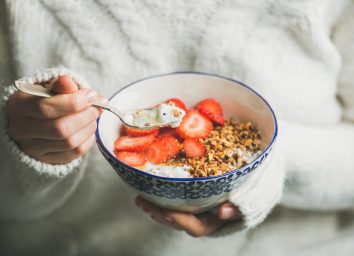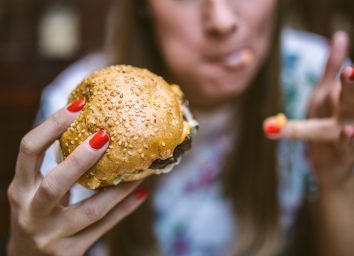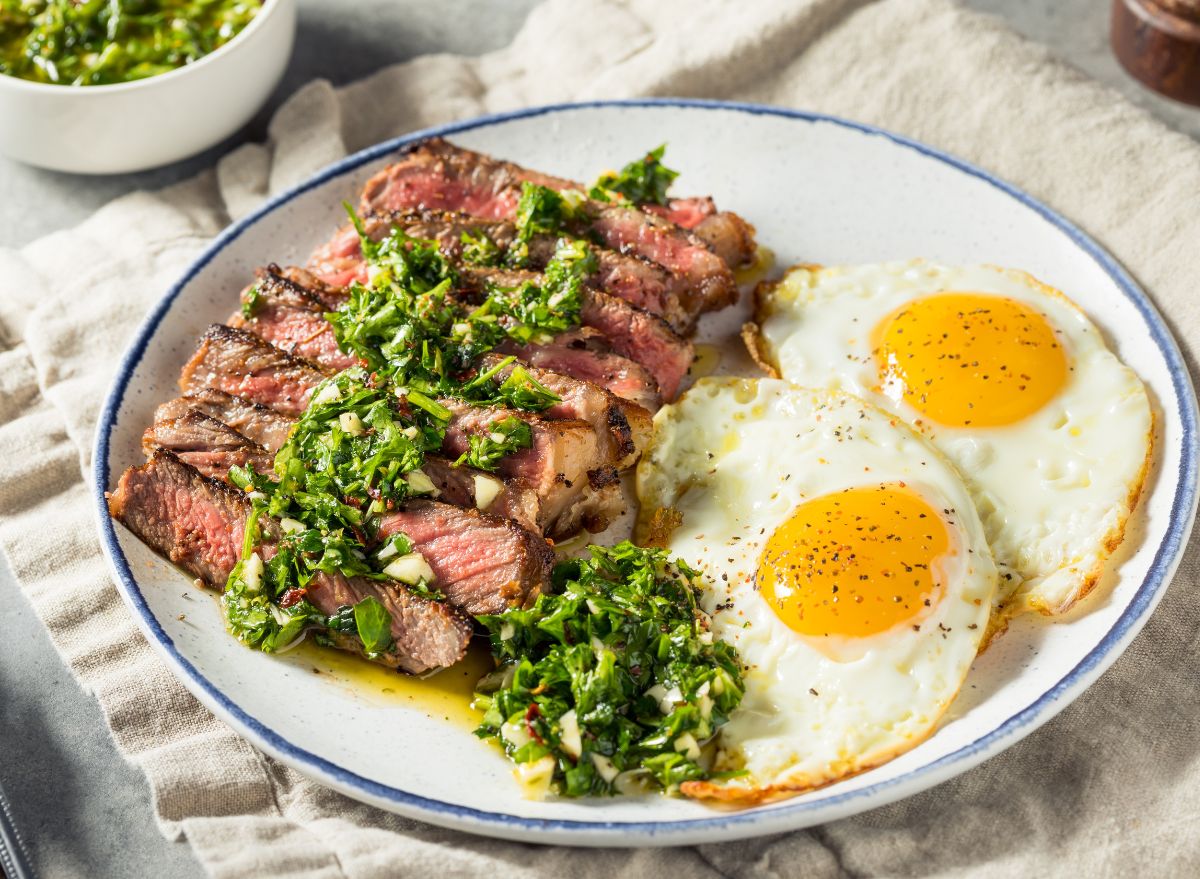
It seems that everyone is talking about protein these days—but it's for good reason. What was once just talked about as an important nutrient for those trying to bulk up and build muscle is now understood as a crucial macronutrient for every person, regardless of health goals. And if you're trying to make sure you eat enough protein throughout the day—which is about 0.8 grams per kilogram of body weight for the average sedentary adult—a great way to get a headstart in the morning is chowing down on some high-protein breakfast foods.
Protein at breakfast will not only keep you full until lunch, but also it helps you build muscle and promotes healthy physical recovery from your morning workout. Some other surprising benefits of eating more protein with breakfast include feeling more satiated to the point where you're less inclined to indulge in extraneous snacking, which, in turn, can help support weight loss. For instance, one study on young women found that those who ate a high-protein breakfast were less likely to snack late in the evening. Another research study on young people who were overweight or obese revealed that adding extra protein at their first meal of the day prevented body fat gain.
But which foods make for the best high-protein breakfast you can make? Keep reading to find out which high-protein foods received a dietitian's stamp of approval below. Then when you're finished here, learn how to best combine these ingredients with some recipe inspiration for high-protein breakfast ideas in 34 High-Protein Breakfasts That Keep You Full.
Chia seeds
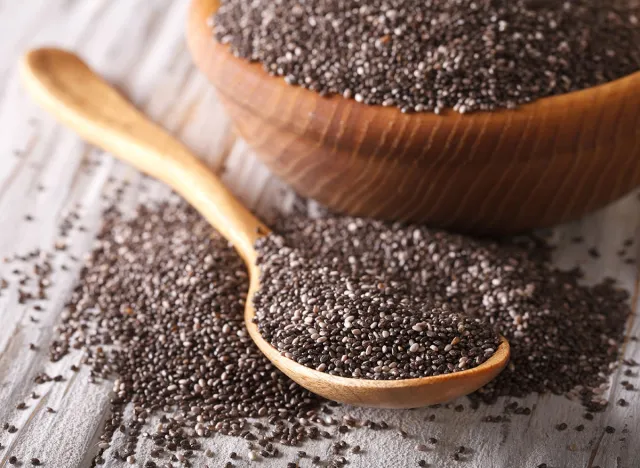
Protein per ounce: 4.7 grams
Chia seeds are a great food to add to morning meals such as yogurt, smoothies, overnight oats, or on top of your bowl of cereal. And according to Mary Sabat MS, RDN, LD, chia seeds are "a great source of protein, fiber, and omega-3 fatty acids."
In fact, a study published in Nutrition Research and Practice found that people who ate chia seeds in their yogurt for breakfast experienced more fullness after eating, and therefore ate fewer calories following that meal.
Tofu
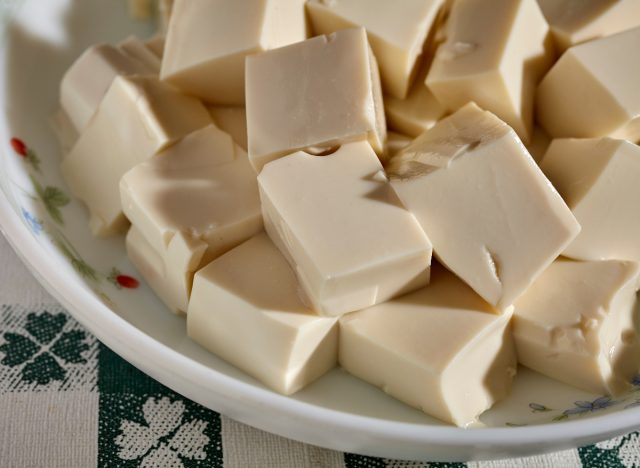
Protein per 3 ounces: 9.2 grams
Tofu is a go-to for plant-based eaters, but even meat-eaters can enjoy this high-protein breakfast food.
"This is a versatile plant-based protein source that can be used in various breakfast recipes," says Sabat. "You can scramble it as a replacement for eggs or incorporate it into a breakfast stir-fry or tofu breakfast burrito."
Aside from being high in protein, tofu is also a helpful source of calcium—the nutrient that aids in muscle, bone, and nerve health.
Steak
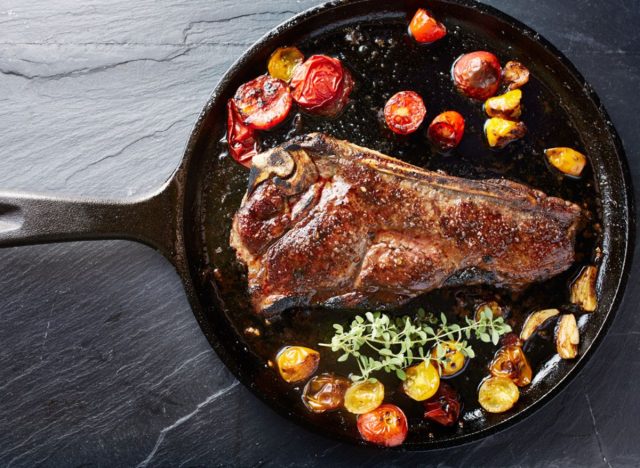
Protein per 4 ounces: 24 grams
At first glance, you may not think of steak as a breakfast food. But after fixing yourself a plate of steak and eggs or rolling up some leftover steak into a tasty breakfast burrito, and your eyes will be open to a whole new realm of high-protein breakfast wonder.
"Cook a lean cut of steak, such as sirloin or flank steak, and slice it into thin strips, then scramble some eggs and add the cooked steak strips to the eggs," advises Sabat. "Wrap this mixture in a whole wheat tortilla, along with some vegetables like bell peppers and onions, for a protein-packed breakfast burrito."
Even though steak is packed full of flavor and protein, you will want to consider the levels of total fat and saturated fat. A serving comes with about 4 grams of saturated fat, and according to the American Heart Association, the average person will want to try to limit their daily consumption to about 13 grams. If you're trying to monitor your intake of saturated fat, you may want to rethink consuming steak on a regular basis.
Protein pancakes
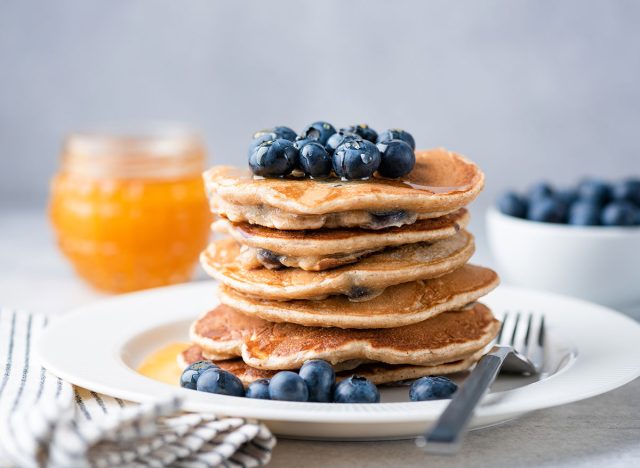
Protein per serving of Simple Mills Protein Almond Flour Pancakes: 11 grams
Pancakes can be a special sweet treat to have in the morning, but regular ol' pancakes are often just full of refined carbohydrates and sugar, which can spike your blood sugar and leave you feeling hungry and unsatisfied. That's why Sabat suggests trying protein pancakes—either the kind that you make yourself from scratch or a store-bought mix.
"You can make protein-rich pancakes using ingredients like protein powder, cottage cheese, or Greek yogurt," says Sabat. "Simply mix these ingredients with whole grain flour and your preferred sweetener, and cook them like regular pancakes. This way, you'll have a protein-packed and delicious breakfast option."
When it comes to finding a quality, store-bought high-protein pancake mix, Protein Almond Flour Pancakes from Simple Mills is a great short-stack solution when you're short on time. However, nothing compares to a stack of homemade pancakes—so on mornings when you're less rushed, try our mouthwatering Protein-Packed Blueberry Lemon Ricotta Pancakes Recipe.
Turkey bacon
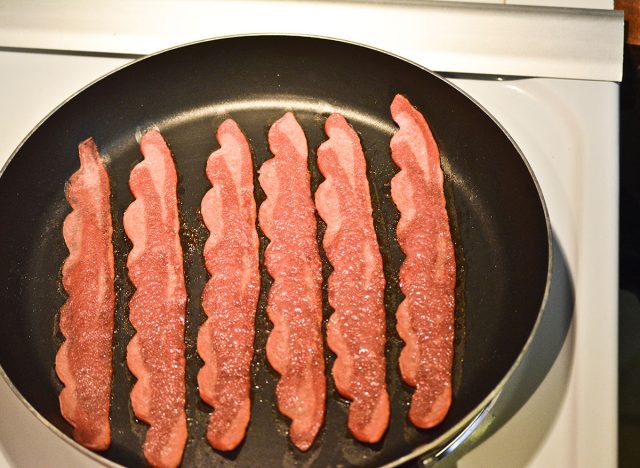
Protein per 28-gram serving (cured): 5.99 grams
Sometimes what you're craving for breakfast is a savory side item next to your scrambled eggs. For these mornings, a couple of slices of turkey bacon can make for a satisfying high-protein breakfast. Cured turkey bacon will be almost 6 grams of protein. While some brands of uncured turkey bacon may be just shy of this protein count, they're also still considered high-protein products—but, unlike the cured kind, they've not been preserved in nitrates or nitrites, two chemicals that have been linked to cancer. For instance, one slice of Applegate Uncured Turkey Bacon will still give you 5 grams of protein.
Eggs
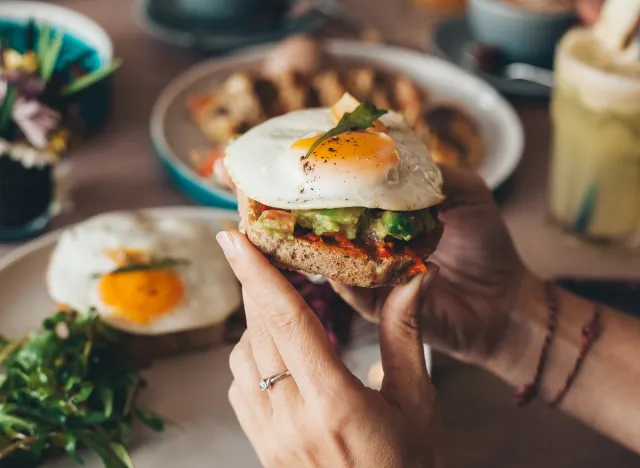
Protein per 1 large egg: 6.3 grams
The centerpiece of many breakfast burritos and morning omelets, eggs are one of the most obvious choices for high-protein breakfast foods. They're inexpensive, easy to cook in ways that won't bore you, and boast a savory taste that goes well with just about anything.
Then there's the fact that each little white orb comes with 6 grams of protein! By scrambling or poaching just two eggs, you'll take in 12 grams. As an animal product, eggs also are classified as a "complete" protein, meaning they contain all the essential amino acids your body must get from food.
Worried about eggs' cholesterol? Research about eggs' impact on heart health is ever-evolving. If you have high cholesterol, talk to your doctor about how often to eat them, and try pairing them with high-fiber, nutrient-dense foods like leafy greens, whole wheat toast, or fresh fruit.
Cottage cheese
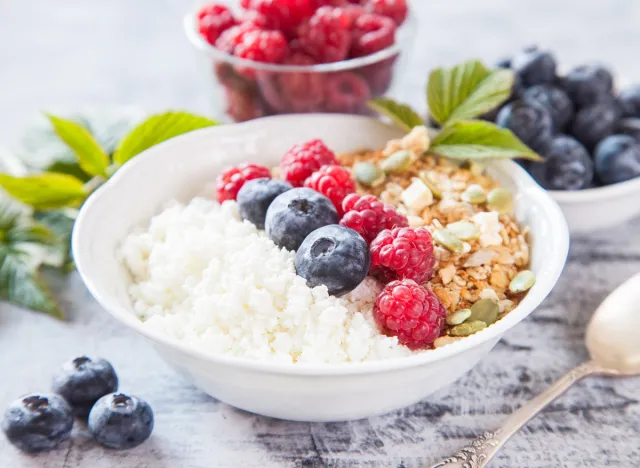
Protein per 1/2 cup cottage cheese, 1% fat: 14 grams
All dairy contains protein, but not all cheeses are equal when it comes to this macro.
Because of cottage cheese's high ratio of casein to whey (two different types of animal proteins), it happens to be a protein powerhouse. Some cottage cheese brands have about 10 grams per serving, but try Organic Valley's low-fat variety, which packs 15 grams—and just 100 calories—per half cup!
At breakfast time, the mini-curds require minimal effort to prepare. Spread cottage cheese atop a bagel or toast (everything bagel seasoning makes a tasty topper) or mix in your favorite berries for a quick meal that's high in both protein and fiber. Or, you can see which latest viral cottage recipe seems the most appealing to you.
Greek yogurt

Protein per 7-oz container Greek yogurt: 19.9 grams
Another dairy pick, Greek yogurt earns its protein prestige. Case in point: a small 5-ounce container of Fage's 2% Plain Greek Yogurt comes with a sizable 15 grams of protein. Like cottage cheese, the Greek version of this dairy product gets its epic protein content from higher levels of casein than traditional yogurt. And while some folks shy away from dairy foods for fear of fat, research shows that, due to their satiation factor, milk proteins could aid weight loss and improve metabolic health overall.
Need some inspiration for going Greek at breakfast? Try freezing Greek yogurt with maple syrup and dried fruit for a tasty "bark," or add some to your overnight oats.
Smoked salmon
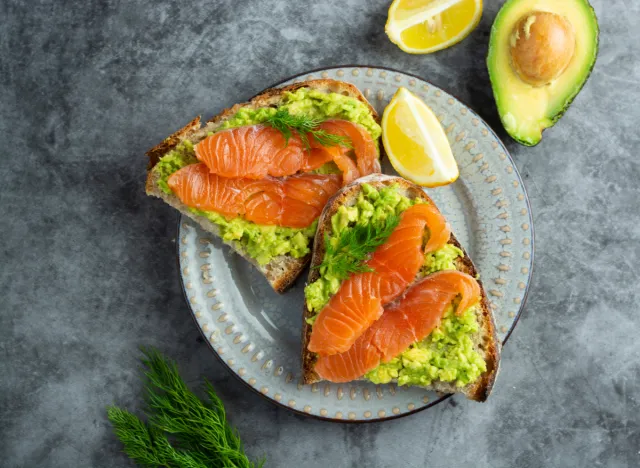
Protein per 3-oz serving smoked salmon: 15.6 grams
When you reach for salmon at any meal, you probably know you're making a good choice. This fatty fish is loaded with brain-boosting omega-3s, immune-supporting vitamin D, and of course, protein.
Then again, after rolling out of bed on a busy weekday, you're most likely not thinking of pan-searing a salmon filet. For breakfast, try smoked salmon instead. A 3-ounce serving provides almost 16 grams of protein, and pre-cooked slices can easily top bagels, mix into an egg scramble, or make for a unique breakfast sandwich you won't find at most drive-thrus.
Oats
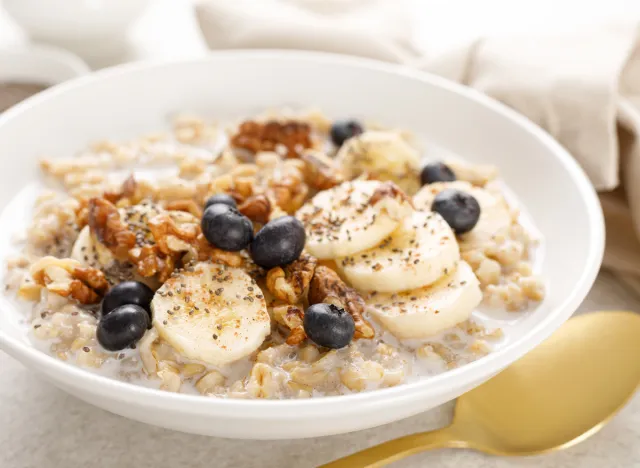
Protein per 1/4 cup oats: 6 grams
Many people associate protein with animal products like meat and dairy—but certain grains contain respectable amounts, too. You can count oatmeal as a high-protein breakfast food, and ounce for ounce, steel-cut oats are typically the highest-protein pick, with about 6 grams per quarter-cup.
Besides boasting plenty of protein of their own, oats can be a vehicle for even more of this macro from tasty mix-ins. Consider a protein upgrade from nuts like almonds or walnuts, a swirl of Greek yogurt, or even a scoop of protein powder.
Nut butters
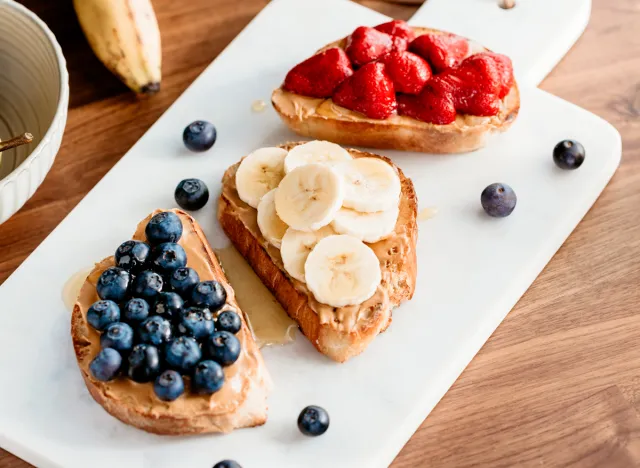
Protein per 2 tbsp of peanut butter: 7.1 grams
The possibilities for nut butter at breakfast are just about endless. In addition to the usual schmear of peanut butter on toast, you can plop a spoonful of nut butter into oatmeal, smoothies, muffins, or snack balls. When you do so, you'll rack up your protein intake. Two tablespoons of both peanut butter and almond butter contain about 7 grams of protein.
An intriguing study in the British Journal of Nutrition even found that, in women with obesity, eating peanut butter at breakfast helped control blood sugar and appetite throughout the day. As you pick your perfect nutty spread, just check labels to make sure you're not getting too much added sugar and fat. A quality peanut butter needs just two ingredients: peanuts and salt.
Quinoa
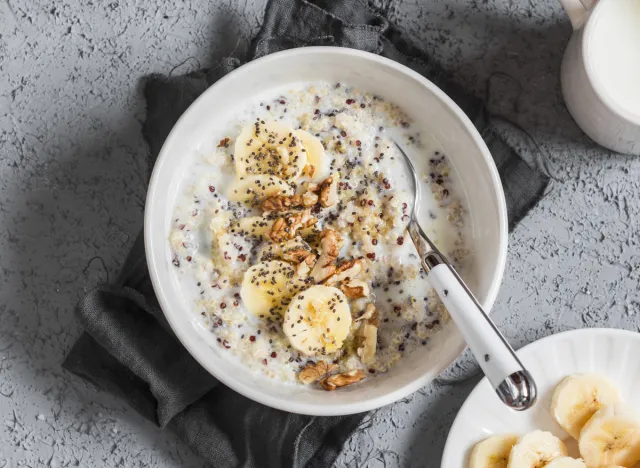
Protein per 1 cup quinoa, cooked: 8.1 grams
Quinoa at breakfast? Don't knock it 'til you've tried it! This grain is the perfect addition to your morning meal because it's high in protein (8 grams per cup), fiber, folate, copper, iron, and zinc. Plus, its mild, nutty taste is perfect for a palate-pleasing start to the day.
If you've made a big batch for dinner, save extra quinoa for the next morning and sprinkle it atop a yogurt parfait or even an omelet. Or, consider making a quick quinoa porridge from scratch, cooking the grains on the stovetop with milk and cinnamon until they resemble oatmeal.
A previous version of this story was published on October 26, 2022. It has been updated to include additional copy and proofreading revisions, additional research, and updated contextual links.
- Source: https://www.ncbi.nlm.nih.gov/pmc/articles/PMC5872778/
- Source: https://www.ncbi.nlm.nih.gov/pmc/articles/PMC7539343/
- Source: https://www.ncbi.nlm.nih.gov/pmc/articles/PMC6566799/
- Source: https://www.ncbi.nlm.nih.gov/pmc/articles/PMC6142015/
- Source: https://www.ncbi.nlm.nih.gov/pmc/articles/PMC3718776/
- Source: https://onlinelibrary.wiley.com/doi/10.1002/oby.21185/
- Source: https://fdc.nal.usda.gov/fdc-app.html#/food-details/170554/nutrients
- Source: https://e-nrp.org/DOIx.php?id=10.4162/nrp.2017.11.5.412
- Source: https://fdc.nal.usda.gov/fdc-app.html#/food-details/173788/nutrients
- Source: https://fdc.nal.usda.gov/fdc-app.html#/food-details/169433/nutrients
- Source: https://www.heart.org/en/healthy-living/healthy-eating/eat-smart/fats/saturated-fats
- Source: https://fdc.nal.usda.gov/fdc-app.html#/food-details/171287/nutrients
- Source: https://fdc.nal.usda.gov/fdc-app.html#/food-details/173417/nutrients
- Source: https://fdc.nal.usda.gov/fdc-app.html#/food-details/170903/nutrients
- Source: https://nutritionandmetabolism.biomedcentral.com/articles/10.1186/1743-7075-10-46
- Source: https://fdc.nal.usda.gov/fdc-app.html#/food-details/173687/nutrients
- Source: https://fdc.nal.usda.gov/fdc-app.html#/food-details/1948126/nutrients
- Source: https://fdc.nal.usda.gov/fdc-app.html#/food-details/173904/nutrients
- Source: https://fdc.nal.usda.gov/fdc-app.html#/food-details/172470/nutrients
- Source: https://fdc.nal.usda.gov/fdc-app.html#/food-details/172470/nutrients
- Source: https://fdc.nal.usda.gov/fdc-app.html#/food-details/168588/nutrients
- Source: https://www.cambridge.org/core/journals/british-journal-of-nutrition/article/acute-and-secondmeal-effects-of-peanuts-on-glycaemic-response-and-appetite-in-obese-women-with-high-type-2-diabetes-risk-a-randomised-crossover-clinical-trial/D713043991EBB7A9ED1CB167CC9780E1/
- Source: https://fdc.nal.usda.gov/fdc-app.html#/food-details/168917/nutrients

